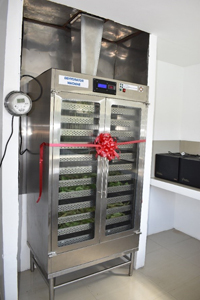 Production of local herbal tea used to have little scientific back-up that will ensure maximum benefits from the tea products. There were no established protocols on material collection, drying, and brewing. Processing equipment were very limited, hence producers were unable to meet market demand.
Production of local herbal tea used to have little scientific back-up that will ensure maximum benefits from the tea products. There were no established protocols on material collection, drying, and brewing. Processing equipment were very limited, hence producers were unable to meet market demand.
A new dehydrator machine that efficiently dries herbal tea materials was recently developed by the Iloilo Science and Technology University (ISAT U), through the funding support of the Philippine Council for Agriculture, Aquatic, and Natural Resources Research and Development of the Department of Science and Technology (DOST-PCAARRD).
With the new dehydrator machine, tea producers in the province of Iloilo like Ephrathah Farms will now be able to increase their production capacity from the usual 0.5 kg/day to 5 kg/day at a lower energy cost. Ephrathah Farms is a producer of herbal tea in Brgy. Sariri, Badiangan, Iloilo and ISAT U’s partner in testing the machine.
According to Dr. Renerio S. Mucas of ISAT U, the dehydrator machine can efficiently dry fresh leaves of guava, moringa, guyabano, and roselle flower petals. It uses solar radiation to heat up the air that flows inside the dehydrator. The system consists of a solar heat catcher (installed outdoor) and a drying chamber fitted with 12 trays where the leaves are dried.
The drying process takes place when the heated air flows through the trays containing the leaf samples. Drying takes place due to the difference in moisture concentration between the drying air and the air in the vicinity and inside of the crop surface. This drying process is known as convective heat transfer. In case of insufficient solar radiation, the dehydrator will utilize a back-up electric heater.
Dr. Mucas is an associate professor of ISAT U in La Paz, Iloilo City. He led the PCAARRD-funded project “Design and development of a programmable dehydrator machine for herbal tea materials.” Aside from machine fabrication, Dr. Mucas and his team completed the phytochemical screening of the herbal tea raw materials and products, optimized the drying protocol of herbal tea materials and analyzed the shelf life of processed tea.
Moreover, Dr. Mucas said that for optimum results, herbal tea materials should be dried at 45 °C until the desired moisture content of 8 % is obtained. At this moisture content, most of phenol content and high antioxidant activity of the tea materials are retained.
Patent application for this machine has already been filed at the Intellectual Property Office of the Philippines (registration no 3-2018000623). A paper titled “Performance evaluation of a programmable dehydrator machine for herbal tea materials” was also published in International Journal of Engineering Science and Computing (IJESC) June 2019 issue.
ISAT U will continue its field testing and promotional activities. The project team is providing capability-building assistance to interested fabricators and adopters.
The development of the dehydrator machine and drying protocol are expected to raise production of not only dehydrated crops but also of fishery products in the region.
